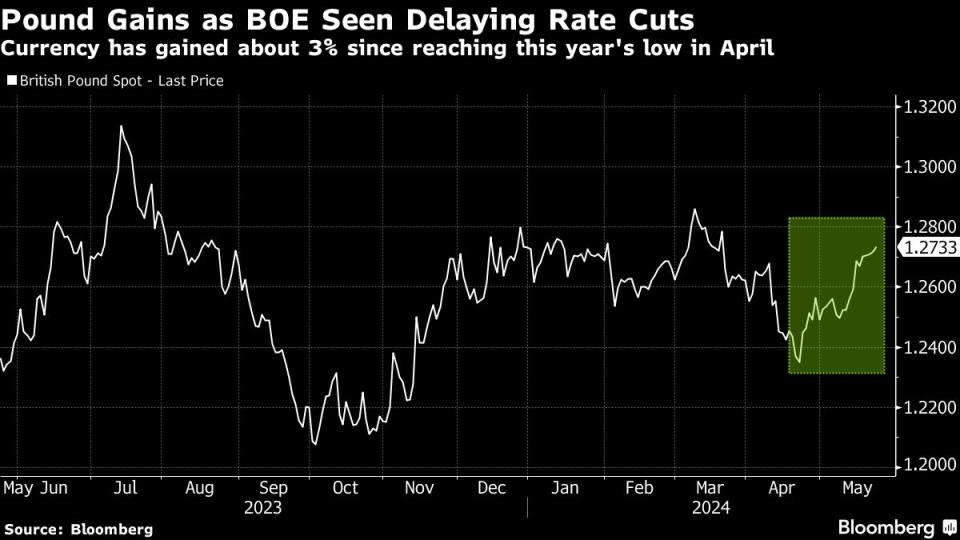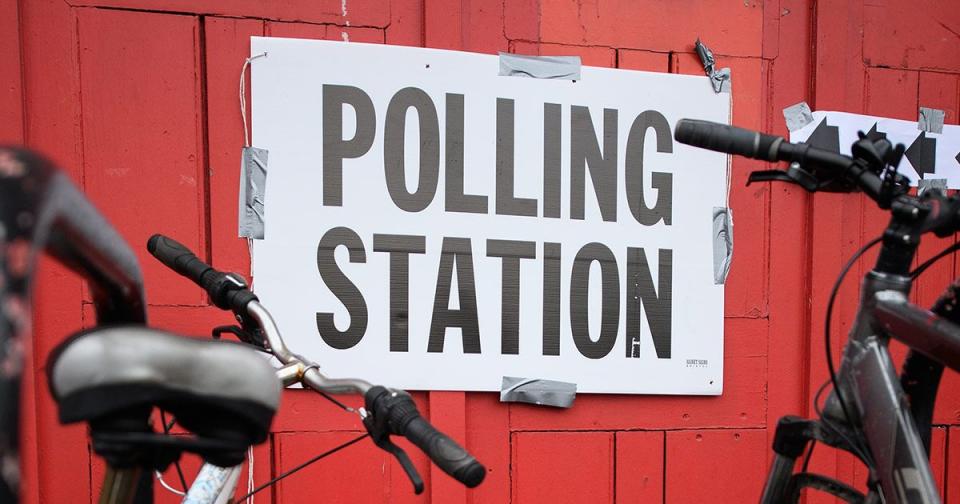Pound Boosted With BOE to Stay on Hold Until After Election
(Bloomberg) -- The pound’s peer-beating rally received another boost this week as an interest-rate cut by the Bank of England next month became virtually unthinkable to traders.
Most Read from Bloomberg
India’s Markets Brace for Selloff as Modi’s Poll Goals in Doubt
China’s Housing Rescue Has a Poor Track Record in Pilot Cities
Xi’s China EV Dream Came True. 10 Years On, Walls Are Going Up
Sterling is poised for its best month since November, extending its outperformance among major counterparts this year, on the view that borrowing costs will stay high for longer to cool inflation. Now, with Prime Minister Rishi Sunak calling a general election on July 4, what little risk remained of a cut before then has all but vanished.
The assumption is that unless it truly has to, the BOE would prefer not to shift monetary policy in an election cycle for fear of being dragged into the political debate as it was during Liz Truss’s premiership and the Brexit referendum. While the institution is independent and takes decisions based on incoming data alone, a reduction next month could still spark questions, according to Jefferies Financial Group Inc. and Citigroup Inc.
The July election “further reduces the chance of a near-term BOE cut,” Jamie Searle, a strategist at Citigroup wrote in a note. “Beyond that, it takes away the risk of a later election interfering with the BOE cycle, and puts the focus fully on data-dependency.”
That’s bolstering the case to favor sterling, especially against the euro. The European Central Bank is likely to reduce rates as early as June, widening the pound’s yield advantage, and prompting firms including Credit Agricole SA, Bank of America Corp and Monex Europe Ltd to reinforce their bullish calls.
It comes at a time when the carry trade — a strategy that harvests the extra income on higher-yielding assets like the pound — thrives across global markets, further bolstering the currency’s performance. Sterling is on track to post its second straight week of gains against the dollar and the euro, and is up nearly 2% versus the greenback this month to trade at around $1.2730.
The inflows have also helped narrow the so-called Brexit premium, a term often used to describe the extra returns investors demand to own UK assets. While sterling is still far weaker than it was prior to the referendum to leave the European Union in 2016, it is now trading near its strongest level against the common currency in two years.
“Carry is king, volatility is low and the macro backdrop is conducive to a stronger pound,” said Kamal Sharma, a currency strategist at Bank of America. He said the pound is in a “sweet spot of carry.”
No Chance
That narrative gained traction this week after a report showed consumer-price growth slowed less than expected last month, with services inflation remaining particularly high. In response, traders scaled back bets on a BOE rate cut in June, bringing the implied probability to close to zero from about 50% before the data.
Meanwhile, Goldman Sachs Group Inc, Morgan Stanley, HSBC Holdings Plc and Barclays Plc all pushed back calls for a reduction to August from June previously. For the rest of the year, the market now favors one cut instead of two in total.
“BOE rate cuts could be fewer and farther between than previously thought especially if the July general election results in a period of political stability and economic growth,” said Valentin Marinov, head of G10 FX strategy at Credit Agricole. “All this should keep the pound’s rate advantage in place.”
Sunak’s call for a summer election came as a surprise, as he had been widely expected to wait until the autumn allowing more time for a cost-of-living crisis to recede. The Labour party has held a poll lead of about 20 points for months, meaning few expect the Tories to extend their 14 years in power.
A measure of the pound’s expected swings jumped on Wednesday as traders prepared for the earlier-than-expected vote. Still, the moves were largely contained, with two- and three-month measures of implied price swings against the dollar remaining well below their one-year averages.
‘Brexit Premium’
Strategists at Barclays say a Labour government could potentially forge closer ties between the UK and the European Union. While Labour has ruled out re-joining the single market or customs union, it wants closer cooperation with the EU and has said it would seek to ease some Brexit-related trade barriers and establish closer ties with the EU on defense.
“Closer ties with the EU should help to unwind at least some of the pound’s Brexit premium,” Barclays’s Lefteris Farmakis said. The bank forecasts the pound will advance to 83 pence per euro by the end of the year, making it among the most bullish on the pound in a Bloomberg poll. It was trading around 85 pence on Thursday.
The prospect of higher-for-longer UK rates is prompting a change of heart even for those who are bearish on the pound. Kaspar Hense, senior portfolio manager at RBC BlueBay Asset Management, has long been underweight the pound, but said he has become less bearish in the past few weeks.
“Carry has been a large driver of the FX market for the last year and sterling has profited from that despite low growth and the UK’s consistent dependency on foreign capital,” he said. “It has done better recently, and rightly so, as an earlier election and a more prudent BOE are positives for the pound.”
--With assistance from Alice Gledhill.
(Updates pound price in sixth paragraph.)
Most Read from Bloomberg Businessweek
TikTok Video Playing on Finance Bro Stereotype Becomes a Viral Hit
The Dodgers Mogul and the Indian Infrastructure Giant That Wasn’t
How the ‘Harvard of Trading’ Ruined Thousands of Young People’s Lives
A Hidden Variable in the Presidential Race: Fears of ‘Trump Forever’
©2024 Bloomberg L.P.




